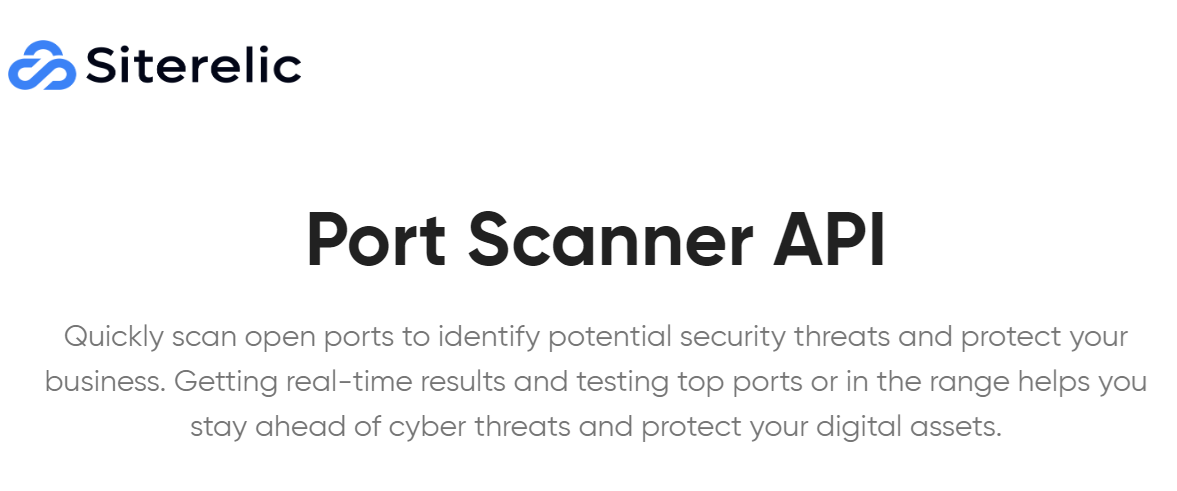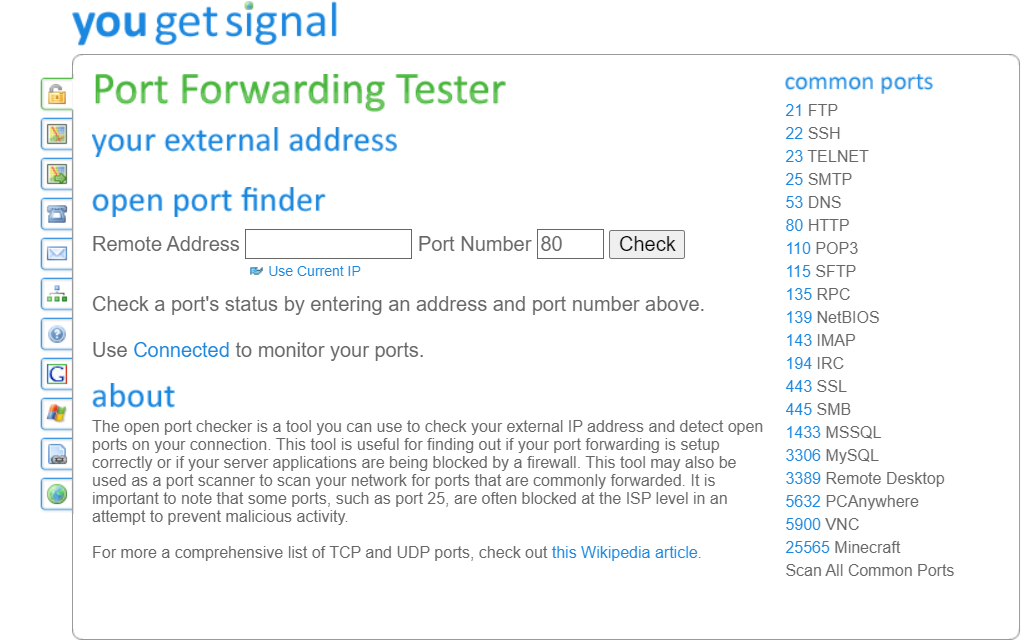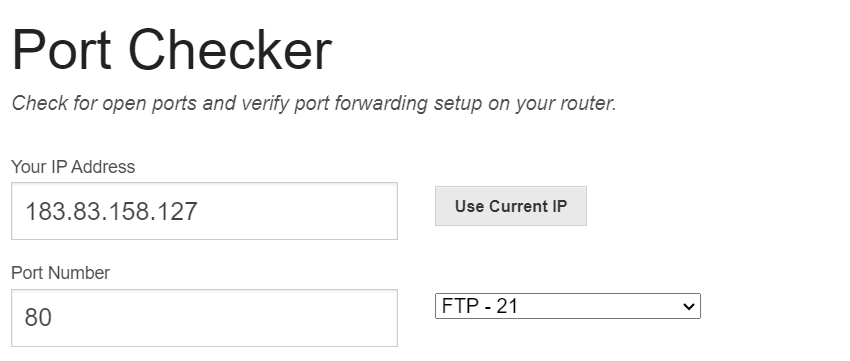Port scanning is a technique to explore a network by checking specific ports for openness. It helps identify potential vulnerabilities and weaknesses in a system’s security.
Online Port Scanning is a method of scanning ports on a target computer or network device using web-based tools, APIs, or services instead of installing software locally. It allows users to check the status of ports remotely without the need for direct access to the target system.
Port scanning sends messages to a target device’s ports to determine if they are open, closed, or filtered, providing insights into network configurations and potential vulnerabilities. It helps identify active services and assess the security posture of a system or network.
The following are online port scanners, which are done through the browser without installing anything, and if you need a standalone utility for advanced features and more control, you should check port scanner tools.
- 1. Pentest-Tools – Best for In-depth Security Assessments
- 2. Siterelic – Best for API integration
- 3. HackerTarget – Best for Security Professionals and Enthusiasts
- 4. WhatIsMyIP – Best for Casual Users
- 5. IPVoid – Best for Quick Network Diagnostics
- 6. DNSChecker – Supports Common Ports Only
- 7. YouGetSignal – Best for Visualizing Port Status
- 8. PortChecker – Best for Simplicity
- Show less
Pentest-Tools
Best for In-depth Security Assessments
Pentest-Tools is an online platform offering a suite of tools and resources primarily focused on penetration testing and cybersecurity. It provides various tools and services that assist security professionals, ethical hackers, and IT administrators in assessing the security posture of their systems, networks, and applications.
Pentest-Tools is a cloud-based toolkit for offensive security testing focused on web applications and network penetration testing.

Pentest-Tools Pros
Offers rapid and comprehensive scanning of target networks to identify open ports and services.
Detailed reports on discovered ports, aiding in vulnerability assessment and network hardening.
Pentest-Tools Cons
Each IP address within a range is considered a separate asset, so selecting a plan that fits your or your organization’s specific needs is important.
Requires some technical knowledge to use effectively.
Pentest-Tools Pricing
You can start with a Free plan, which allows scanning for up to 5 assets with 2 parallel scans.
Siterelic
Best for API integration
Siterelic API-driven online port scanner offers flexibility and programmable scanning capabilities.
Sirterelic provides real-time results and tests top ports or a range of ports that can help you proactively defend against cyber threats.

Siterelic Pros
Scalable and highly available platform powered by AWS
Offers faster execution, high uptime, and reliable infrastructure.
API endpoints are available over HTTPS, ensuring secure data processing with 256-bit TLS encryption.
Developer-friendly API documentation for easy integration.
Siterelic Cons
Only available to paid users.
Siterelic Pricing
Siterelic API plans start at 10,000 API calls for $9.99 monthly.
HackerTarget
Best for Security Professionals and Enthusiasts
HackerTarget provides a suite of security tools, including port scanning, penetration testing, vulnerability assessment, and network security analysis.
The port scanning was done using Nmap, which was pretty fast; it took less than 2 seconds to scan 1 IP.

HackerTarget Pros
Access advanced scanning capabilities with Advanced Nmap options for a thorough network security assessment.
Schedule daily scans and set up automated alerts to stay informed about any changes or threats in real-time.
Utilize a suite of 27 Vulnerability Scanners and IP Tools for comprehensive scanning and analysis.
HackerTarget Cons
A subscription is needed to access advanced features.
The free version only scans the common ports.
HackerTarget Pricing
HackerTarget offers two plans: Standard Plans and Enterprise Options. The Standard Plan pricing starts at $10 monthly for Starter, $25 monthly for PRO, and $50 for Business. The Enterprise Options are Enterprise-1 at $100 monthly and Enterprise-2 at $200 monthly.
WhatIsMyIP
Best for Casual Users
WhatIsMyIP offers network tools like IP address lookup, WHOIS lookup, DNS lookup, network scanner utilities such as traceroute and ping, and a user-friendly port scanning tool for identifying open ports on specific IP addresses or hostnames.
WhatIsMyIP port scanner tool was tested with a single IP address and 13 basic ports, providing prompt and accurate results and demonstrating efficiency.

WhatIsMyIP Pros
Straightforward tool designed for users with limited knowledge of port scanning
Offers a user-friendly port scanning tool, enabling both single and group port scans free of cost.
WhatIsMyIP Cons
Advanced functionalities are available only for Gold membership users.
WhatIsMyIP Pricing
WhatIsMyIP offers three pricing tiers – Bronze (free), Silver ($10 per year), and Gold ($25 per year) with different features.
IPVoid
Best for Quick Network Diagnostics
IPVoid TCP Port Scanner probes IP addresses and discovers open ports, allowing for quick assessment of a server’s active services. With this scanner, you can swiftly assess your server’s active services like Apache, mail, SSH, FTP, MySQL, Telnet, and DNS.
IPVoid offers a detailed view of open TCP ports using the Nmap port scanner for accurate and quick scans. It can scan IPv4 and IPv6 addresses, allowing users to scan common or define custom ports.
IPVoid Pros
Offers an intuitive interface for efficient network diagnostics.
The user-friendly design of IPVoid makes it a top choice for quick troubleshooting and analysis tasks.
IPVoid Cons
An excessive number of ads can detract from the overall user experience.
It does not support simultaneous scanning or scanning IP address ranges.
DNSChecker
Supports Common Ports Only
DNSChecker provides various DNS analysis tools, including DNS lookup, propagation checks, and port scanning. Users can verify port forwarding and perform WHOIS lookups through the user-friendly interface.
DNSChecker provides a free custom port scanning feature, allowing users to define their own ports for scanning.

DNSChecker Pros
Scan multiple ports by selecting a range or entering a non-sequential list
Conduct on-demand scans
DNSChecker Cons
Users are disturbed by unwanted ads on the site.
Not suitable if you are looking for the scheduled scan
YouGetSignal
Best for Visualizing Port Status
YouGetSignal is a free online IP scanner that supports port scanning and can scan multiple IP addresses.
YouGetSignal is a valuable resource for network administrators, IT professionals, and individuals looking to troubleshoot network issues, analyze domain information, and enhance their overall network security posture.

YouGetSignal Pros
It supports port scanning, domain and IP address lookup, and reverse IP domain check.
It offers a user-friendly interface, enabling users to perform various network diagnostic tasks quickly and efficiently.
YouGetSignal Cons
Only one port can be scanned at a time.
Does not have advanced scanning capabilities.
PortChecker
Best for Simplicity
PortChecker stands out among free online port scanners for its simplicity and user-friendly interface.

PortChecker Pros
Provides quick tests for single port checks.
Users can remain anonymous as no account is necessary.
PortChecker Cons
Limited to scanning one IP address per scan.
Users might experience interruptions from advertisements during and after scanning.
What is a Port Scanner?
A port scanner is used to identify open ports on a computer or network device by sending requests to specific port numbers. It is used by security professionals and network administrators to identify network vulnerabilities and troubleshoot network issues.
Should Port Be Open or Closed?
Ports should be closed unless required, as open ports can expose systems to security risks. Only essential ports should be opened and secured with firewalls and access controls. Regular monitoring and updating of systems is necessary to patch vulnerabilities.
Unnecessary ports should be closed for security reasons, such as those associated with vulnerable protocols. The decision to open or close ports on your network should be made based on a careful assessment of security requirements and operational needs.
How Do Cyber Criminals Use Port Scanning to Prepare for Cyberattacks?
Cybercriminals frequently use port scanning during the reconnaissance stage of a cyberattack. In this stage, they scan the network to identify active devices and their open ports. This helps them gather information about running applications and potential weaknesses that could be exploited.
Port scanning aids attackers in selecting specific attack vectors and understanding how active security measures could be bypassed. Tools like IP scanning, Nmap, and Netcat are commonly used for these tasks.

